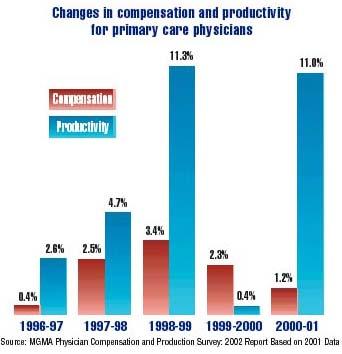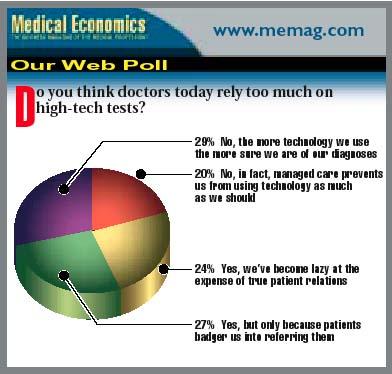Article
Practice Beat
Compensation, The Malpractice Crisis, Antitrust, Physician Workload, Electronic Transactions, Medical Careers, Our Web Poll
Practice Beat
Joan R. Rose
Compensation: Primary care physicians are running harder just to stay in place
Last year, average compensation for primary care physicians rose a mere 1.21 percent (to $149,009), while productivity increased 11 percent, according to the Medical Group Management Association's 2002 Physician Compensation and Production Survey. (See our extensive report on physician income, coming in the Nov. 22 issue.)
The 2002 income figures may be even worse with the impact of this year's 5.4-percent cut in Medicare reimbursement and the industry-wide increases in medical liability premiums. Moreover, despite doctors' best efforts to control costs and increase revenue, the continued growth in Medicare beneficiaries will only exacerbate existing problems, the MGMA saysunless Congress and the Bush administration correct what doctors contend is a faulty formula used to calculate Medicare fee updates.

The Malpractice Crisis: Tax credits for doctors in the Keystone State?
Pennsylvania lawmakers recently passed laws that lower some premiums, strengthen patient safety measures, and limit liability to just the defendant's individual share. That might help in the long term, but more needs to be done, says state Sen. Connie Williams, because doctors are still leaving the state.
Williams has introduced a bill that would give physicians a 10 percent credit for medical malpractice insurance expenses against their tax liability. The credit would apply to premiums, surcharges, and other costs related to obtaining coverage required as a condition of licensure. If approved, the credit would begin with tax year 2002 and expire in 2004. Williams readily admits that her short-term fix is little more than a "Band-Aid" for a critical condition, but hopes it will encourage doctors to remain in Pennsylvania while legislators seek a permanent solution to the malpractice crisis.
Antitust: The FTC's crackdown on health care providers
Without admitting guilt, doctors in Texas and Colorado have settled Federal Trade Commission charges that they fixed prices.
According to the FTC complaints, Genesis Physicians Group (a 1,500-physician IPA) in Dallas-Ft. Worth and eight Denver-area ob/gyn groups used their market power to force insurers to accept fees that the physicians had collectively agreed upon. In addition, the commission contended that Denver groups advised physicians to terminate or threaten to terminate their existing contracts with payers to win new contracts with higher fees. Lastly, the FTC found that the Denver groups didn't engage in any cooperative joint activity that would justify collective bargaining.
Physician Workload: Got lunch? Some doctors do, some doctors don't
In a survey of 836 physicians, Medical Economics found that the average lunch break was 29 minutes, but only 22 percent of those surveyed took a half-hour lunch break five days a week.

Electronic Transactions: The deadline for HIPAA compliance is rapidly approachingor not
Just a few days remain for you to bring your office into compliance with a HIPAA regulation requiring the use of standardized formats when transmitting health insurance claims and other transactions electronically. But if your office can't meet the Oct. 16 deadline, you can take advantage of a one-year extension authorized by Congress.
Complete the compliance form you'll find at the CMS Web site and click "submit." You'll receive an online confirmation number, which will serve as acknowledgment of your extension. If you can't submit your form electronically, or you want to submit your own version, you may mail a paper copypostmarked no later than Oct. 15but CMS won't acknowledge receipt of paper submissions, so be sure to send it by US Postal Service, return receipt requested.
Go to www.cms.hhs.gov/hipaa/hipaa2/ascaform.asp for more information.
Medical Careers: How dissatisfied are doctors really?
Despite the challenges physicians face today, more than seven out of 10 say they're satisfied with their decision to go into medicine. However, only one in five reports being "very" satisfied, according to a study by the Archives of Internal Medicine (July 22). If you graduated from a foreign medical school, are the full owner of your practice, earn between $50,000 and $99,999, and are immersed in managed care, chances are good that you're unhappy with your chosen profession.
But researchers also found that the high incomes and prestige historically associated with some specialties no longer guarantee happiness, either. Doctors in "procedural" specialties are even more likely than those in"cognitive" specialties to be dissatisfied. Researchers blame most of that unhappiness on managed care.
Over the past 15 years, they note, the advancement of managed care caused procedure-centered specialties to suffer considerable loss of income, autonomy, and practice opportunities.

The author is a Contributing Writer.
Yvonne Wollenberg. Practice Beat. Medical Economics 2002;19:22.





